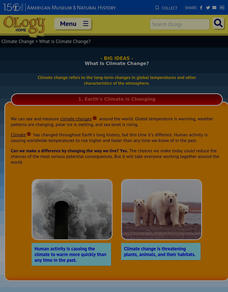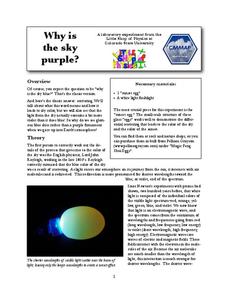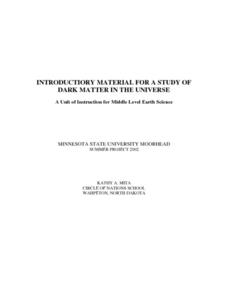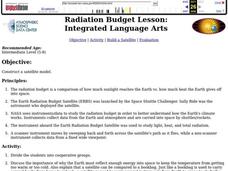Community Consolidated Schools District 168
Solar System Model Project
Challenge young astronomers to demonstrate their knowledge of the solar system with this fun open-ended science project. Provided with a short list of requirements, students are given the freedom to use their creativity and whatever...
NOAA
Tides
Low tides, high tides, spring tides, neap tides, diurnal tides, semidiurnal tides, mixed tides ... just how many types of tides are there? The 10th installment of a 23-part NOAA Enrichment in Marine sciences and Oceanography (NEMO)...
Research Parent
Solar System Cards
Find all things solar system in a set of reference cards. Even Pluto makes an appearance! Each of the 24 cards has a picture and accompanying informational text that gives brief background about the object.
American Museum of Natural History
What Is Climate Change?
So many factors show that climate change has arrived. Learners read through an online resource that explains the data and the consequences of climate change. They also review strategies for slowing or even reversing the global influence.
Teach Engineering
Skin and the Effects of Ultraviolet Radiation
Though UV radiation can damage skin, it isn't all bad. The third installment in a six-part series allows the class to study the structure and function of skin. They learn about the different types of skin cancer and the SPF rating...
Columbus City Schools
Experiencing Eclipses
Don't be caught in the dark! Young scientists investigate the causes of both solar and lunar eclipses using an interactive to help them understand the development of an eclipse over time. They then research facts and characteristics of...
NOAA
Make Your Own Compass
Scholars build a compass using a needle, cork, magnet, and a water-filled cup in order to locate the magnetic north and south.
Colorado State University
Why Is the Sky Purple?
The color of the sky depends on the time of day. Young scholars experiment with scattering different wavelengths of light to recreate the color of the sky. They observe both the longer blue wavelengths and the shorter red and orange...
Curated OER
Dark Matter In The Universe
Students investigate the concept of dark matter and how it occurs in the universe. They conduct research using a variety of resources. Students use the information by reading at least two articles about dark matter. They also generate...
Curated OER
Radiation Budget
Students examine the radiation budget and the launching of the Budget Satellite. They role-play as designers of the satellite and construct one with a power source, instruments, and sensors. they explain how their satellite functions...
Curated OER
Climate Shifts
Eight slides of information related to shifts in the climate make up this presentation. The vocabulary and concepts displayed are geared toward high school meteorology learners. Content is not cohesive from slide to slide, but the...
Curated OER
Seasons Worksheet
Middle and high schoolers are given a diagram of the Earth rotating around the Sun. They label the seasons in the proper place, highlight special days such as the vernal equinox and autumnal equinox, the dates the special days fall on,...
Core Knowledge Foundation
Third Grade Skills Unit 7: What’s in Our Universe?
Over four weeks, third graders participate in lessons that boost spelling, grammar, reading, and writing skills. Scholars explore spelling patterns, suffixes, singular and plural possessive nouns, quotations, and conjunctions....
Curated OER
Solar Storms
Students investigate the cycles of solar activity. They plot the solar activity and use the graph to answer a number of questions and explain the relationship between the solar storms and sunspots and the impact on earth and space travel.
Curated OER
The Flat-Out Truth
In this Earth's shape worksheet, students read an article about a gentleman who believes the Earth is flat. Then students complete 5 short answer questions.
Curated OER
An Overview of Solar Radiation
Learners examine the Stefan-Boltzmann Law. Students compute basic radiative "constants" of the sun-Earth-atomosphere system. They examine the wavelength of maximum radiation emission.
Curated OER
A New Slant On The Seasons
Students identify how the tilt and position of the Earth causes the seasons. After a discussion of the seasons and when they begin. Using themselves as the objects in the universe, they role play how the rotational movement of the...
Curated OER
Coronal Mass Ejections
In this coronal mass ejections worksheet, students observe a time line of events that took place during a solar storm. Students use the time line to answer 3 questions about the solar storm and the time it took to reach Earth. Students...
Curated OER
How Hot is that Planet?
In this planet worksheet, high schoolers read about finding the temperature of a planet using the distance to its star, its reflectivity and the luminosity of the star. Students use a given equation to determine the surface temperature...
Curated OER
The Transit of Mercury
In this transit of Mercury worksheet, students read about Earth and Mercury lining up so that Mercury passes across the disk of the sun from the Earth's view. Students solve 3 problems and they determine the diameter of the solar disk...
Curated OER
Solar Effects on Global Warming
Students explore the greenhouse effect and how it affects our climate. In this global warming lesson students draw the sun and label features and describe the effects of the sun's energy on the world.
Curated OER
Modeling the Change of Seasons
Students evaluate data to determine changes in length of day. They model the revolution of Earth around the sun to show changes in length of day and sun angle and illustrate how the sun angle affects the change of season.
Curated OER
Seeing Solar Storms in STEREO-I
In this geometric calculations of solar storms worksheet, students use a diagram indicating the location of 2 STEREO satellites, the earth and the sun to calculate the distance between a Coronal Mass Ejection and the Earth. They use...
Curated OER
Student Exploration: Summer and Winter
In this recognizing the seasons online/interactive worksheet, students explore the Earth's positions and determine the summer and winter season. Students answer 21 short answer questions
Other popular searches
- Earth Moon Sun System
- Sun and Earth
- Earth Sun and Moon
- Earth/sun/moon
- Sun Moon Earth
- Earth, Sun and Moon
- Sun and Earth Kindergarten
- Sun and Earth Orientation
- Rubric Sun Moon Earth
- The Sun and Earth

























